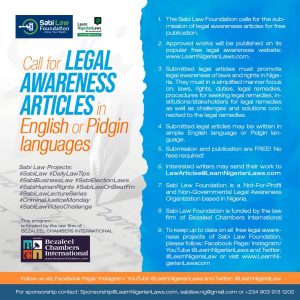How to Obtain Letters of Administration. Daily Law Tips (Tip 740) by Onyekachi Umah, Esq., LL.M, ACIArb(UK)
Introduction:
One of the characteristics of human beings is the ability to die. Death is the end of the physical existence of a human being and this brings some legal challenges. It creates questions like, what happens to the property of a dead person (deceased), what happens where there is no WILL and who takes over ownership and management of the property of a dead person? To save the living some stress, it is advisable to make a valid WILL before death.
This work focuses on how to obtain power and control (letters of administration) over the property of a dead person that died without a WILL. The case study here is Abuja, the Federal Capital Territory, however, the same/similar processes and procedures are obtainable in all the states across Nigeria.

Forms and Procedures for Letters of Administration:
Although everyone is encouraged to make a WILL at all times, since death comes like a thief in the night, not everyone will die with a WILL. Also, there may be new property acquired after a WILL or omitted from a WILL. So, there is a chance for the management and control of the property of a person that died without a WILL. The bad news is that, where there is no WILL, the persons to takeover and benefit from the property of a dead person, may not be the persons that the dead person would have appointed as beneficiaries, if the dead person had made a WILL. So, it is better to always have a valid WILL.

Where a person dies without a WILL, the surviving family members of the dead person can approach the Probate Registry to obtain power and control over the property of the dead person. My earlier work (can be read via <https://sabilaw.org/daily-law-tips-by-onyekachi-umah-esq-tip-144-who-can-inherit-property-of-a-dead-person-in-nigeria/> has listed out the family members that can seek for such power and control, and their order of priority. It is always advisable to engage the services of a legal practitioner ahead of a visit to a Probate Department, so that the lawyer offers a detailed guidance all through the entire process. The Probate Departments in Nigeria are located in the state High Courts at the thirty-six (36) states in Nigeria. Probate Departments are established to handle matters of WILL, letters of execution (this power is given where there is a WILL) and letters of administration (this power is given where there is no WILL).

The surviving family members of a dead person are to visit the Probate Department of the High Court in charge of the area where the dead person resided. In this work, we will assume that the dead person resided within the coverage of the High Court of the Federal Capital Territory. The Probate Department of the High Court of the Federal Capital Territory (FCT) is located at the Headquarters of the High Court of FCT, at Plot 426 Tigris Crescent, Aguiyi Ironsi Street, Maitama, Abuja. It stands opposite the Headquarters of the National Youth Service Corp (NYSC) and the Corporate Affairs Commission (CAC).
The following information and documents are needed by a Probate Department for it to give power and control over property of a dead person to family members of the dead person. The family members seeking such power and control must provide;
- Death Certificate (Original and Photocopy) from Hospital or National Population Commission. The original copy is for physical sighting.
- A letter of introduction of Next of Kin from the deceased office. (The Next of Kin must be the closest living relatives/family members of the deceased)
- A minimum of 2 next of kin (wife to come with marriage certificate, passports photographs and with any of her children that is above 18 years). The child must come in person with one passport photograph each and photocopy of his/her means of identification (International Passport, Work I.D. National I.D card, Voters Card, etc.)
- Two sureties that are resident in Abuja (who must come in person) are persons that are above the age of 18 years with traceable home addresses and places of work. Every Surety must come with one passport photograph and a photocopy of his/her means of identification (International Passport, Work I.D. National I.D card, Voters Card, etc.)
- The name of the pensioner’s managers of the deceased and PEN number must be provided (if there is a pension).
- Name(s) of the bank account of the deceased and account number and bank branch, must be provided. Since there is Bank Verification Numbers (BVN) in Nigeria now, it may be helpful to have such number to ensure that no bank account of a deceased person is left out.
- Document of landed property (if the deceased had any).
- Share certificates (if the deceased had shares in companies and businesses). Also note that a fee (estate fees on shares) will be charged on the total shares upon assessment.
- Certificates and proofs of any other property whatsoever (including credits owed the deceased, royalties, franchise, star registrations, trademarks, patents, golds and jewelries).
- The following complex documents are also needed; The Probate Application Form; Declaration of Next of Kin Form; Oath of Administration; Administration Bond; Statutory Affidavit of Next of Kin, Justification of Sureties; and Inventory. (This is another good reason to engage the services of a legal practitioner).
- The following information are also needed; Names of Widow or Widower and date of marriage; Name of Parents of the deceased and their addresses; Name of Brothers and Sisters of the deceased and their addresses; Names of the others of the children and their addresses of persons they live with.
- Application fee of N5,500 Naira Only is needed.
- Publication fee of N4,000 for a private edition that gets published within 24 hours or N10,500 Naira only for public edition which takes longer time to be done. Note that the publication will last for 21 days. Publication is made to give public notice to the world about the powers sought over the property of a deceased by his/her next of kin, so that any person with a conflicting interest may put in a protest, just like a marriage notice.
- Estate fee on landed property N50,000.00 each property (where among the deceased’s property is a land or landed property, the next of kin must pay an estate fee for each land/landed property).
- Letter of instruction to a lawyer. Note that a next of kin can empower his/her lawyer by a letter of authority to complete the processes, after the next of kin must have come to court to complete all required forms.
- All original copies of the above stated documents must be produced for sighting.
- Opening of files starts from 8:00am and stops at 1:00pm, no applications will be honored after this time.
Requirements for Completing a “Next of Kin Form”:
- Name of next of kin and his/her relationship with the deceased.
- Address
- Form and date of Marriage (copy of Marriage Certificate must be attached. This applies where a next-of-kin is a spouse of the deceased).
- Names and ages of children of the deceased seeking to be next of kin, their ages and names of their mothers.
- Names of the minor children; name and addresses of persons they live with.
- Name and address of the deceased.
- Names and addresses of the brothers and sisters of the deceased.
- The persons who will inherit the minor’s property if he/she dies.
Conclusion:
Death of a person is not the death of the person’s property. The closest family members of a dead person have right to seek and obtain authority of the property of the dead person. The authority is “Letters of Administration”, so far as there is no WILL. The processes for obtaining such authority may be complex, slow and frustrating, so the services of lawyers are needed. However, it is not compulsory to engage a lawyer.
My authorities, are:
- Section 1, 2, 3, 4, 5, 6, 17(3)(f), 33, 34, 37, 39, 40, 41, 318 and 319 of the Constitution of the Federal Republic of Nigeria, 1999.
- Section 49(1) of Administration of Estates Law, Lagos State and similar laws in other states of the Federation
- Judgment of the court in the case of Williams V. Ogundipe (2006) ALL FWLR (part 327)p.540.
- Onyekachi Umah, “Who Can Inherit Property Of A Dead Person In Nigeria.” (LearnNigerianLaws.com, 18 July 2018) <https://sabilaw.org/daily-law-tips-by-onyekachi-umah-esq-tip-144-who-can-inherit-property-of-a-dead-person-in-nigeria/> accessed 19 February 2021.
- Onyekachi Umah, “How To Recover Property Of The Dead In Nigeria. [A Legal Guide On Probate Matters In Nigeria]” (LearnNigerianLaws.com, 10 March 2016) <https://sabilaw.org/how-to-recover-property-of-the-dead/> accessed 19
- Onyekachi Umah, “A “WILL” Without Good Financial Provision For Family Can Be Cancelled” (LearnNigerianLaws.com, 7 December 2020) <https://sabilaw.org/a-will-without-good-financial-provision-for-family-can-be-cancelled/ > accessed 8 December 2020
- Onyekachi Umah, “Can a “Will” be Rewritten After Death of its Owner ?” (LearnNigerianLaws.com, 1 November 2018) <https://sabilaw.org/daily-law-tips-by-onyekachi-umah-esq-tip-218-can-a-will-be-rewritten-after-death-of-its-owner/> accessed 19 February 2021
- Onyekachi Umah, “Requirements Of A Valid/Genuine Will” (LearnNigerianLaws.com, 13 July 2020) <https://sabilaw.org/requirements-of-a-valid-genuine-will-daily-law-tips-tip-608-by-onyekachi-umah-esq-ll-m-aciarbuk/ > accessed 5 December 2020.
- Onyekachi Umah, “Can An Inheritance Under A “Will” Be Rejected?” (LearnNigerianLaws.com, 6 May 2020)<https://sabilaw.org/can-an-inheritance-under-a-will-be-rejected-daily-law-tips-tip-563-by-onyekachi-umah-esq-llm-aciarbuk/ > accessed 5 December 2020
- Onyekachi Umah, “He 4 Facts Courts Must Consider In Evaluating Expert Opinions On Handwriting And Signatures On Wills” (LearnNigerianLaws.com, 2 November 2019) <https://sabilaw.org/the-4-facts-courts-must-consider-in-evaluating-expert-opinions-on-handwriting-and-signatures-on-wills-daily-law-tips-tip-449-by-onyekachi-umah-esq-llm-aciarb-uk/ > accessed 5 December 2020
- Onyekachi Umah, “Acceptable Age For Making Of Wills In Nigeria” (LearnNigerianLaws.com, 25 April 2019) <https://sabilaw.org/acceptable-age-for-making-of-wills-in-nigeria-daily-law-tips-tip-318-by-onyekachi-umah-esq-llm-aciarb-uk/ > accessed 5 December 2020
- Onyekachi Umah, “A “WILL” Cannot Over Power Customs In Yoruba & Benin States In Nigeria” (LearnNigerianLaws.com, 9 December 2020) <https://sabilaw.org/a-will-cannot-over-power-customs-in-yoruba-benin-states-in-nigeria/> accessed 19 February 2021
Sabi Law Projects:
#SabiLaw
#DailyLawTips
#SabiBusinessLaw
#SabiElectionLaws
#SabiHumanRignts
#SabiLawOnBeatFm
#SabiLawLectureSeries
#CriminalJusticeMonday
#SabiLawVideoChallenge
Speak with the writer, ask questions or make inquiries on this topic or any other via onyekachi.umah@gmail.com, info@LearnNigerianLaws.com or +2348037665878 (whatsapp).
To receive free Daily Law Tips, join our free Telegram group, via this link: https://t.me/LearnNigerianLaws
To keep up to date on all our free legal awareness projects of Sabi Law Foundation, follow us via
Facebook Page:@LearnNigerianLaws, Instagram: @LearnNigerianLaws, Twitter: @LearnNigeriaLaw and YouTube: Learn Nigerian Laws
Please share this publication for free till it gets to those that need it most. Save a Nigerian today! NOTE: Sharing, modifying or publishing this publication without giving credit to the author or Sabi Law Foundation is a criminal breach of copyright and will be prosecuted. This publication is the writer’s view not a legal advice and does not create any form of relationship. You may reach the writer for more information.
This publication is powered by www.LearnNigerianLaws.com {A Free Law Awareness Program of Sabi Law Foundation, supported by the law firm of Bezaleel Chambers International (BCI).} Sabi Law Foundation is a Not-For-Profit and Non-Governmental Legal Awareness Organization based in Nigeria.




















































